General Welfare
Grumps: Human welfare is in a general decline.
Optimist: Human welfare is generally improving:
Despite "recklessly" increasing its numbers during the past millennium, humanity has never been better fed, healthier, or longer lived. The state of humanity has never been better.
Since Malthus wrote his Essay on Population two centuries ago, the average person’s life span has more than doubled. He is better educated and wealthier. She is freer to choose her rulers and express her views. He is more likely to live under the rule of law and is less fearful of being arbitrarily deprived of life, limb, freedom, property, wealth, and other basic human rights. Her professional, social, and physical mobility, while still limited in many places, is less likely to be circumscribed by caste, class, location, or other accidents of birth. Not only is work less physically demanding, he works fewer hours, earns more, and has more leisure time at his disposal.
The proximate causes for the improvements in the human condition... are the forces of technological change and economic growth, supplemented by trade in products, ideas, and technologies associated with those forces.
Virtually every indicator of human welfare also improves with wealth, as do the environmental indicators that we know to have the greatest bearing on public health... In the United States, this upward march has been in progress at least since the 1880s... Pollution levels did not keep pace with the growth in population or consumption of energy, other natural resources, and chemicals... Despite a 100-fold increase in organic chemical usage, public health has continued to improve... The inverse trends between chemical usage and public health is consistent with the notion that new technology does not, in fact, make matters worse. If anything, it replaces worse risks with risks that are not so bad... In fact, the air and water quality in the United States and the world’s rich nations are better today than they have been in decades. The increase in their agricultural productivity has allowed them to reestablish forests and set habitat aside... As the cases of the Clean Air Act of 1970, Clean Water Act of 1972, and Safe Drinking Water Act of 1974 show, much of the improvements in the United States for the air and water quality indicators examined in chapter 6 preceded the enactment of stringent national environmental laws.
Although many of today’s developing countries haven’t been on the cycle of progress for long, Human Development Indices in their urban areas exceed those in rural areas. This might seem counterfactual to many casual observers given the obvious- and very visible- squalor and pollution in the cities of developing countries such as Mexico City; Teheran, Iran; and New Delhi, India... Because rural areas are generally poorer, they lack access to many of the technologies that have improved human well-being in urban areas... The case of sanitary reform in India also hints at the importance of economic growth... Sanitary reform came to India in 1870, well before it was introduced in Italy in 1890... However, even now, large portions of the Indian population lack access to sanitation. Clearly, neither technology transfer nor knowledge of a technology’s potential is sufficient to stimulate technological change. 21
Grumps: There is so much death and disease in the world.
Optimist: Life expectancy is a good proxy for death and disease and it has been increasing globally, particularly as wealth increases 21.
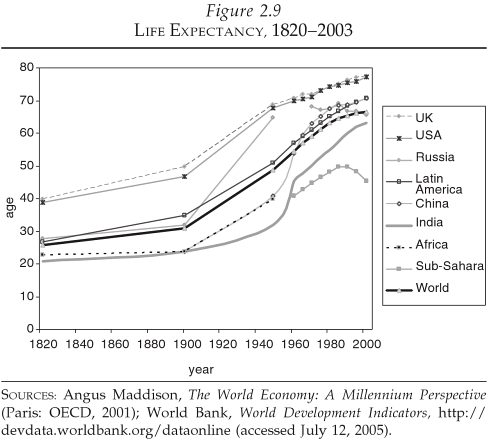
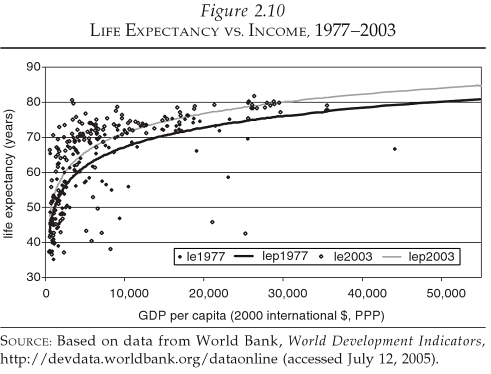
Infant mortality, the major source of this increase, is declining, particularly as wealth increases 21.
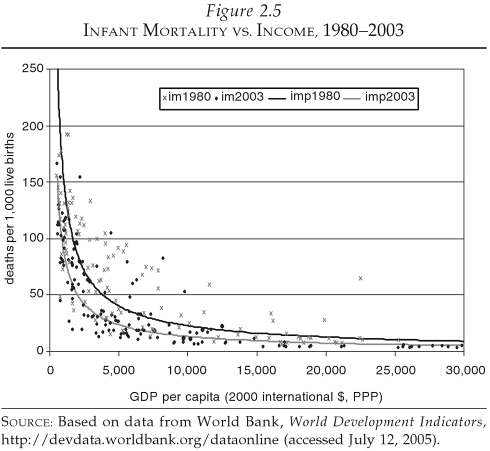
Science
Grumps: What's the value of focusing on reason and evidence, especially when evidence is so often disputed?
Optimist: While it's probably true that human knowledge will never be perfect (including mathematics which is limited by Gödel's incompleteness theorems), approaches such as rationality, finding evidence, and the scientific method, while limited, are the best ways to increase the chances of discovering correct information. Otherwise, it's like picking actions out of a hat. If you had a problem and your doctor picked your treatment out of a hat, you'd be lucky if you weren't made worse off 1.
Education
Grumps: So many people are poorly educated.
Optimist: Years of education per person are increasing where wealth is increasing 21.
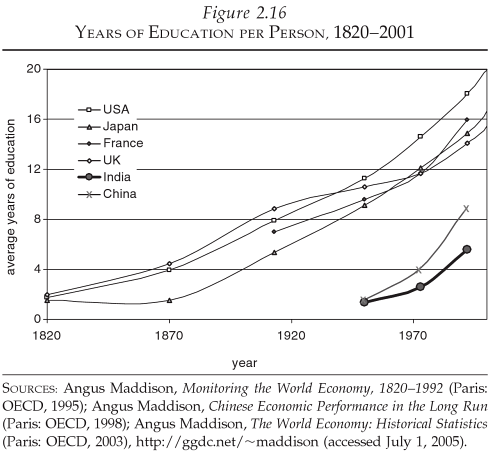
Grumps: Education in schools often seems like pointless drudgery.
Over four years of HSSSE survey administrations, student responses have been very consistent regarding boredom. In a pool of 275,925 students who responded to this question from 2006 to 2009, 65% reported being bored at least every day in class in high school; 49% are bored every day and 16% are bored every class. Only 2% reported never being bored. 2
Nearly half (47 percent) said a major reason for dropping out [of high school] was that classes were not interesting. 3
Optimist: We have the power to educate ourselves to become better people, beyond regurgitators.
"I come back to the absurdity of our education system: it tries to make us not good and wise, but learned and brilliant. And it succeeds. We readily inquire of our star pupils, 'Does he know mathematics?' 'Can he analyse poetry?' But we never ask: 'Has he become a better or a wiser person?' We work merely to fill our memories with facts, leaving our understanding and our sense of right and wrong empty. But after we have been through school, if we are not kinder people and if our judgements are no wiser, then I would just as soon that pupils skipped their classes and spent their time playing tennis instead." 4
Work
Grumps: Humans are working too much.
Optimist: The average annual hours worked per person are decreasing where wealth is increasing 21.
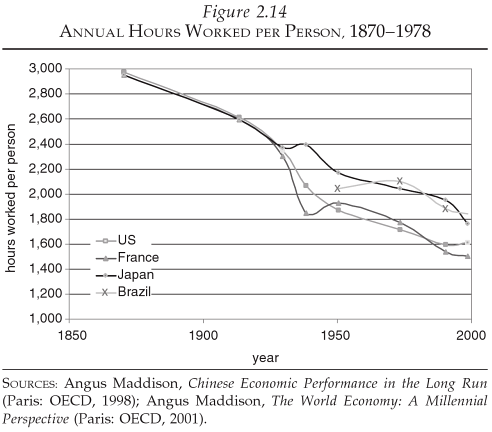
Anyone who doesn’t have at least three hours a day to themselves is a slave, insisted Epicurus, whatever their notional income. He pointed out that by writing our problems down or thinking them over (perhaps on a long walk, which Epicurus was a fan of), we can hugely reduce their hold on us. By understanding them, we are able to remove, if not the problems themselves, then their secondary, aggravating characteristics, like confusion or paranoia. Most people develop psychological problems simply because they have a backlog of anxieties they haven’t had the time to address. 5
Grumps: Child labor is a continuing scourge of the planet.
Optimist: Child labor decreases as people become rich enough to not need it 21.
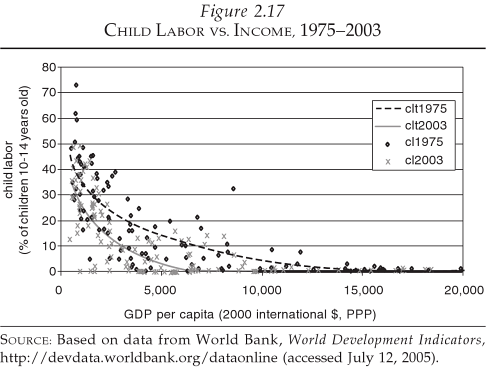
Grumps So many jobs are vacuous, soul crushing wastes.
Optimist: For those that avoid deep, philosophical introspection, the daily grind may help sooth their deeply chaotic lives. Those that strive for happiness will probably escape supposedly soul crushing, dystopian cube farms, and the ease with which others melt into mindless rules and bureaucracies are an optimistic sign that they would be open to more meaningful introspection given the right tools.
The start of work means the end to freedom, but also to doubt, intensity and wayward desires. Our ten thousand possibilities are reduced to an agreeable handful. We have a business card which we hand over in meetings and which tells other people – and, more meaningfully perhaps, reminds us – that we have a place in this world and are not just a vaporous transient consciousness in an incidental universe. How satisfying it is to be held in check by the assumptions of colleagues, instead of being forced to contemplate, in the loneliness of the early hours, all that one might have been and perhaps never will be. 22
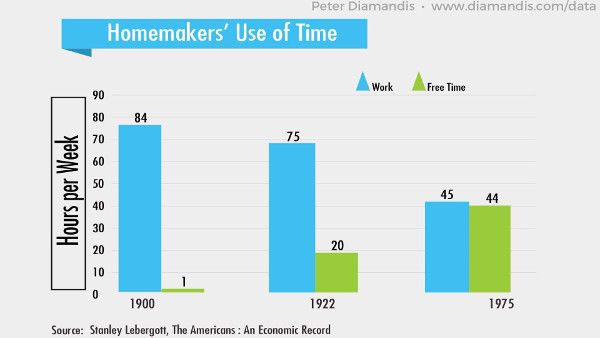
News
Grumps: The news is endlessly fear-mongering, sad, and shocking.
Optimist: The eagerness with which people watch the news points to the needs people have to philosophically evaluate their lives. This shows that people are fundamentally interested in balance and improvement.
To look at the paper is to raise a seashell to one’s ear and to be overwhelmed by the roar of humanity. Today there is a story about a man who fell asleep at the wheel of his car after staying up late into the night committing adultery on the internet – and drove off an overpass, killing a family of five in a caravan below. Another item speaks of a university student, beautiful and promising, who went missing after a party and was found in pieces in the back of a minicab five days later. A third rehearses the particulars of an affair between a tennis coach and her thirteen-year-old pupil. These accounts, so obviously demented and catastrophic, are paradoxically consoling, for they help us to feel sane and blessed by comparison. We can turn away from them and experience a new sense of relief at our predictable routines; we can be grateful for how tightly bound we have kept our desires, and proud of the restraint we have shown in not poisoning our colleagues or entombing our relations under the patio. 22
A balanced life requires a curious combination of inner and outer concern: we have to internalise the general message that emerges from others’ accidents – that we are highly fragile and temporary – without, however, getting so deeply immersed in their particulars that we allow the disasters of strangers to become excuses or means by which we avoid our responsibilities to ourselves. We must both register and yet at the same time not fixate upon the sadness and pain with which the news seeks to confront us at every turn. 6
Grumps: The decadence of society can be seen in the magazines of the checkout line in a supermarket, with the petty and vengeful paparazzi and magazines, and the mesmerized consumer, peering into the lives of celebrities destroying their lives.
Optimist: The demand for these magazines shows the desire people have to bond with each other at a deeper level.
We are mesmerised. But that’s because we crave intimacy. When you really are close to someone it’s not only their good sides you see; you get to know them more deeply. You see their sufferings, you are there when thing go wrong. With a close friend you hear all about the terrible divorce; you know about the drinking bouts.
But mostly this doesn’t happen. Mostly we only ever encounter the edited, airbrushed surface of other people. We say we like strength and admire success. We do, but weakness and failure makes us more connected to the people we like... it is actually reassuring, even nice, to hear about the messes in the lives of others. It’s not cruelty that takes us there, but the need to know that we are normal, that our own troubles are not a unique curse, but that similar things happen even to people who – on the surface – have all the things we lack. 7
Human beings need and will always look for role models. We therefore shouldn't complain about or eradicate 'celebrity culture.' We need to improve it, bringing a better kind of person to the fore of public consciousness: we need better celebrities rather than no celebrities. Rather than try to suppress our love of celebrity, we ought to channel it in optimally intelligent and fruitful directions. A properly organised society would be one where the best-known people (the ones whose parties and holiday photos and clothes and new hairstyles we looked at most often) were those who embodied and reinforced the highest, noblest and most socially beneficial values.
Ironically, it is entirely in the power of serious news organisations to take on the task of celebrity creation. Rather than complain about those the Daily Mail and the New York Post have developed, they would have the chance to start on the business of celebrity-creation on their own.
In its golden age, the ancient city state of Athens was unembarrassed about celebrity culture. It had some legendary celebrities: statesmen like Pericles and Demosthenes, athletes like Philammon the Olympic boxer and Chabrias the chariot racer and musicians like Melanippides and Anakreon. These figures were looked up to as guides to the manners and morals of an entire society.
We need to go the same way. We need serious news outlets to engage with the task of identifying and then promoting a raft of original celebrities. We need them to pick out for us the clever and kind actors, research scientists, molecular biologists, poets, venture capitalists, mothers, nurses, cleaners and parking attendants, the very many people who would be more appropriate targets of celebrity than those we know today – people whose physiques, attitudes and routines we should constantly have paraded before us through enticing photography and heart-warming anecdotes.
The job of serious news outlets is to make the celebrity section no less exciting than it is now, and yet ensure that it features people who will spark our imaginations and help us lead our lives wisely and ambitiously, because they have something properly consoling and good to tell us. Celebrity stories should, in their mature form, make up one of the most serious, worthwhile sections of the most serious news organisations. 8
Human Population
Grumps: The human population has had an explosive and exponential growth and soon there'll be too many humans.
Optimist: It's true that the human population has had an explosive and exponential growth, but as the United Nations reports, for various reasons, worldwide fertility is decreasing and will probably approach a replacement level. It's also possible that the human population will reach a peak and start to decline.
The latest report by the population division of the United Nations 9 shows that the average annual rate of population change for the world is declining and it's projected to continue to decline towards a replacement rate:
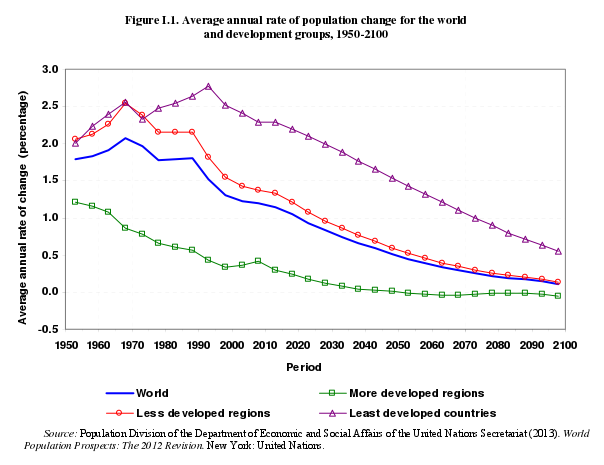
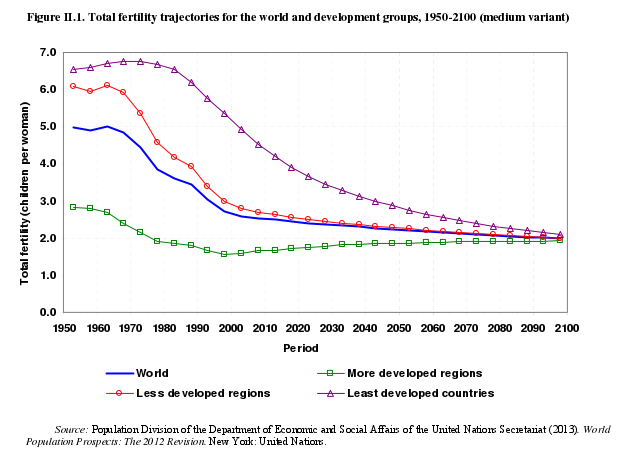
The "low" estimate predicts that human population will peak at about 9 billion and then decline, and the "medium" estimate projects nearly a leveling off at about 10 billion:
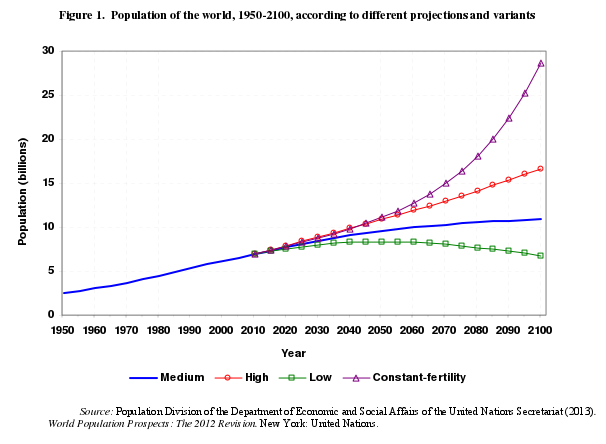
The fertility rate decreases as wealth increases 21.
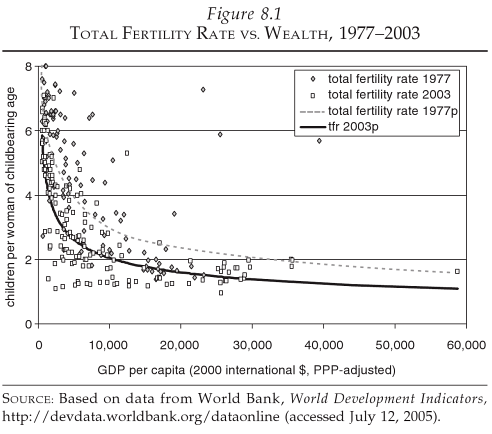
Poverty
Grumps: Poverty is a continuing scourge of the planet.
Optimist: Global poverty as a percentage of the population has been and continues to decrease 21.
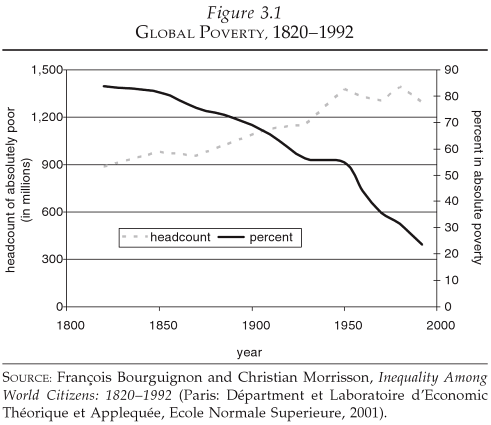
Violence
Grumps: Violence and war are enduring blotches on the human condition.
Optimist: Nearly all forms of human violence are decreasing.
Violence has declined over long stretches of time, and today we may be living in the most peaceable era in our species' existence. The decline, to be sure, has not been smooth; it has not brought violence down to zero; and it is not guaranteed to continue. But it is an unmistakable development, visible on scales from millenia to years, from the waging of wars to the spanking of children. No aspect of life is untouched by the retreat from violence. 23

Grumps: Child abuse seems to be on the rise.
Optimist: We are becoming better and nicer and finally accounting for abuse that used to be acceptable.
There have been so many cases [of child abuse] in recent times. It's easy to feel we live in a sick society. Civilisation is breaking down – emergency measures are called for.
But there's another, perhaps more accurate, way of seeing things. These are times of moral progress. We have become more and more sensitive to, and concerned about, the suffering of others.
When a guy in the 1960's or 70s put his hand up a fifteen year old girl's skirt or made a unilateral grab at a woman's breasts he would not have seen himself as a criminal – like a mugger or a bankrobber. But he knew he wasn't being nice. Just like the man who mouths an enraged insult today.
Our moral aspirations are on the rise. That's why more people are ending up in the dock. 10
Food
Grumps: We have an incessant drive for food.
Optimist: We don't have to struggle to get food as wealth increases 21.
After several thousand years of effort, in the industrialised world at least, we've become the only animals on this planet to be free of an anxious search for the next meal. As a result we have time – in which we can learn Swedish, master calculus and worry about the authenticity of our relationships, avoiding the compulsive and all-consuming dietary priorities under which still labour the emperor penguin and Arabian oryx. 11
Grumps: We can't feed all the people on the planet.
Optimist: Food supplies per person continue to increase, despite the increasing population, particularly as wealth increases 21.
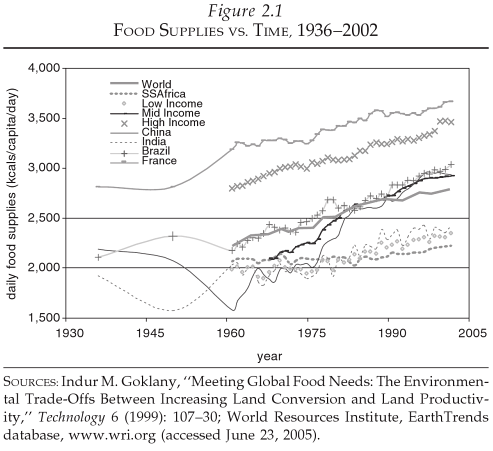
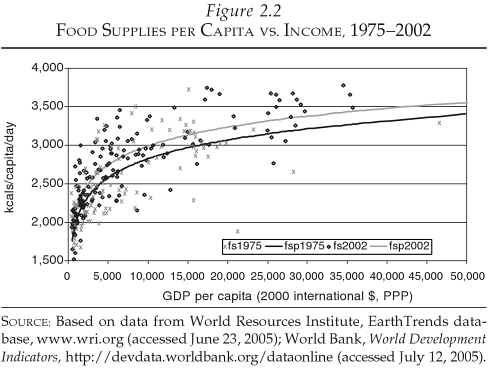
Intelligence
Grumps: The average person is getting dumber.
Optimist: There's evidence that average intelligence has been increasing by three IQ (intelligence quotient) points per decade.
Average scores on intelligence tests are rising substantially and consistently, all over the world. These gains have been going on for the better part of a century—essentially ever since tests were invented. The rate of gain on standard broad-spectrum IQ tests amounts to three IQ points per decade, and it is even higher on certain specialized measures.
In an influential series of papers, Flynn showed that the increasing raw scores appear on every major test, in every age range and in every modern industrialized country. (The rise itself is now often called "the Flynn effect.") The increase has been continuous and roughly linear from the earliest days of testing to the present.
The cause of these enormous gains remains unknown. At this point, no one even knows whether they reflect genuine increases in intelligence or just the gradual spread of some specialized knack for taking tests. Greater sophistication about tests surely plays some role in the rise, but there are other possible contributing factors: better nutrition, more schooling, altered child-rearing practices and the technology-driven changes of culture itself. Right now, none of these factors can be ruled out; all of them may be playing some part in the increasing scores. 12
Racism
Grumps: Racism continues to be a pervasive blotch on our collective consciousness.
Optimist: There is significant evidence that racism is improving.
One of the most substantial changes in racial attitudes has, indeed, been the movement from very substantial opposition to the principle of racial equality to one of almost universal support. For example, in 1942, the vast majority (68 percent) of whites thought that whites and blacks should go to separate schools; in 1995, when the question was last asked, this had dropped to just 4 percent (Schuman et al. 1997).
Fewer and fewer white Americans readily endorse statements that blacks are less intelligent and hardworking than whites; and fewer verbally object to increasing levels of inter-racial mixing in neighborhoods and in marriage partners. 13
Grumps: People responding to surveys may be harboring racism that they don't talk about publicly because of social stigma.
Optimist: There is evidence that things such as positive emotions decrease racism.
Positive emotion reduces at least some racial biases. For example, although people generally are better at recognising faces of their own race than faces of other races, putting people in a joyful mood reduces this discrepancy by improving memory for faces of people from other races (Johnson & Fredrickson, 2005). 24
Medicine
Grumps: Not enough medicine is available to the average person.
Optimist: Health spending increases as wealth increases 21.
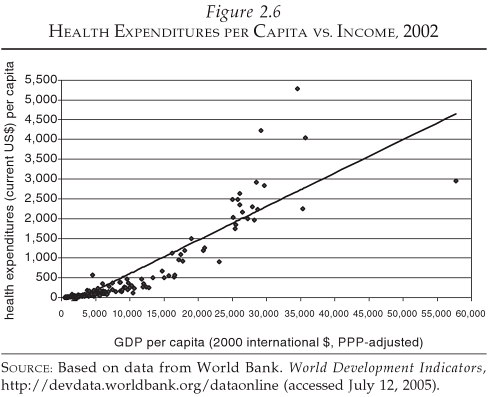
Grumps: I often have very little time with my doctor.
Optimist: A positive mood when first meeting with your doctor and improve diagnoses.
Brief raising of positive mood enhances creative thinking and makes positive physicians more accurate and faster to come up with the proper liver diagnosis (Fredrickson, 2001; Isen, 2005) 14 15.
Energy
Grumps: We are using too much energy and we will soon run out of it.
Optimist: Energy use continues to increase without any supply problems 21.
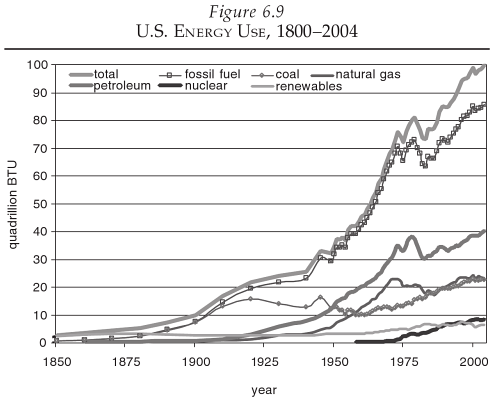
Technology
Grumps: Technology is always failing us and it will never be perfect.
Optimist: Technology is an imperfect yet amazing tool that improves our lives and there's a wealth of awe available in each aspect of it, however big or small.
The traumas and humiliations we experience passing through the airport emerge as mere sideshows in a far more noble central drama: the safe ascent and descent of vast aircraft along two implausibly long runways stained tar-black by rubber and oil. We’re reminded that there is more to flying than air miles and lounges, that it is still a sublime and heroic matter to pit oneself against gravity in an aluminium tube. 16
An interest in constant technological improvement is a sign of hope; hope that we'll work out how to fix stuff: wars, inequality, battery life, anger, dropped signals and – most important of all (yet most secretly) – ourselves... it's in our hands to get our relationships to go slightly better – right now. If we can get hopeful about battery life stretching 30 minutes longer, there's also reason to aim to save one hour a week having less intense arguments.
It's not that we should give up being fascinated by improvements to communications devices that might be available in a few months. It's rather that we need to start treating other parts of existence more like our phones: as things we might improve. We might make a start by trying to fix our characters, one bit at a time, starting now. 17
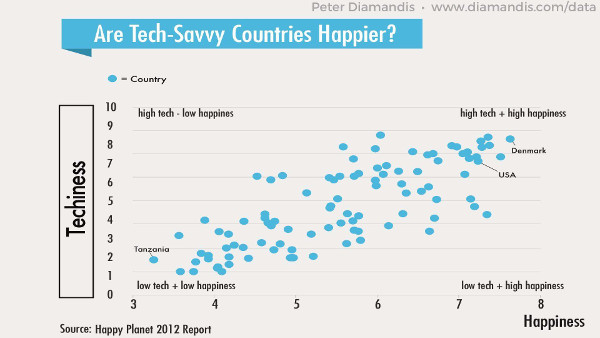
World Government
Grumps: The world will coalesce into a dystopian world government.
Optimist:
One particularly scary scenario for the future is that overblown doomsday worries become the rationale for world government, paving the way for an unanticipated global catastrophe: totalitarianism. Those who call for the countries of the world to unite against threats to humanity should consider the possibility that unification itself is the greater threat.
World government hardly seems like a realistic threat today. Over the course of a few centuries, however, it seems likely to gradually emerge. Nationalism prevents it from happening today, but the emerging global culture has already begun to dilute national identities. (Wright 2000) Cultural protectionism is unlikely to slow this process very much, and in any case the direct benefits of cultural competition are large. (Caplan and Cowen 2004)
In the long-run, it is better is to try to influence global culture instead of trying to fragment it. Xenophobia may be the main barrier to world government for the time being, but it is a weak argument. In fact, there would be good reasons to avoid political centralization even if the world were culturally homogeneous.
How seriously do I take the possibility that a world totalitarian government will emerge during the next one thousand years and last for a thousand years or more? Despite the complexity and guesswork inherent in answering this question, I will hazard a response. My unconditional probability – i.e., the probability I assign given all the information I now have - is 5%. I am also willing to offer conditional probabilities. For example, if genetic screening for personality traits becomes cheap and accurate, but the principle of reproductive freedom prevails, my probability falls to 3%. Given the same technology with extensive government regulation, my probability rises to 10%. Similarly, if the number of independent countries on earth does not decrease during the next thousand years, my probability falls to .1%, but if the number of countries falls to 1, my probability rises to 25%. 18
Research and Development
Grumps: Research and development is driven by the richest countries.
Optimist: Research and development increases as wealth increases 21.
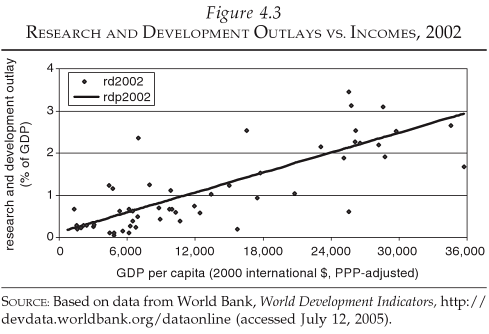
Tragedy
Grumps: There is nothing redeeming in the worst tragedies, from murders, to rapes, to other demented acts of psychos.
Optimist: It is a powerfully humbling and useful exercise to empathize with the craziest of the crazy, for then it may be that there are reasons for everything, some of which we may be able to fix in time.
The challenge is to resist easy moralism, and to see that there are in fact connections, far more than one might wish, between oneself and the most apparently alien figures the news introduces us to. None of us is a stranger to extreme states of mind, it’s just that most of us have had the good fortune not to be pressed too hard by life in those areas where we are most vulnerable. 19
Slavery
Optimist:
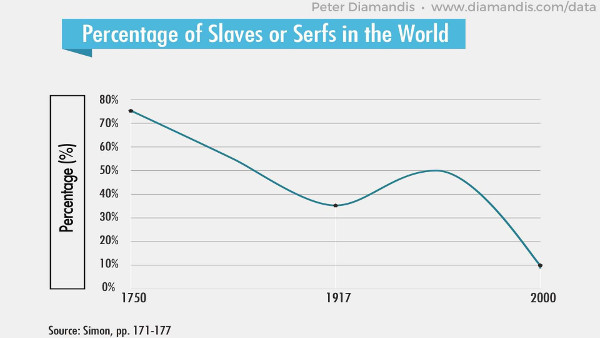
Gender Equality
Optimist:
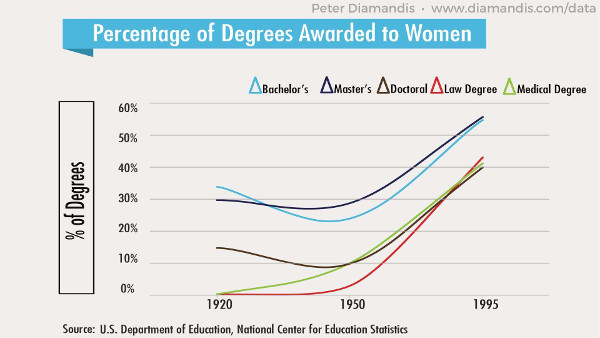
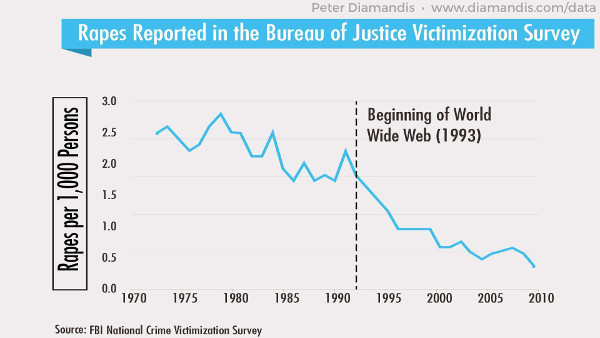
Traffic
Grumps: Traffic is worsened by rubberneckers dangerously glaring at car accidents.
Optimist: It's probably safer that people slow down when passing accidents, for whatever reason, as it allows emergency responders space to work. More deeply, the fascination with accidents points to a common contemplation of death, which is valuable to periodically humble people.
By looking at crashes, we are reminding ourselves of the brevity and precariousness of earthly existence. This doesn’t have to induce madness or despair, indeed, it can sharpen our awareness of what there is to appreciate and usefully refocus our minds on essentials. Far from rendering life meaningless, the thought of death may act as a catalyst to help us discover what we truly believe and want. 20
Monday, Sep 04, 2017 8:19:13 PM